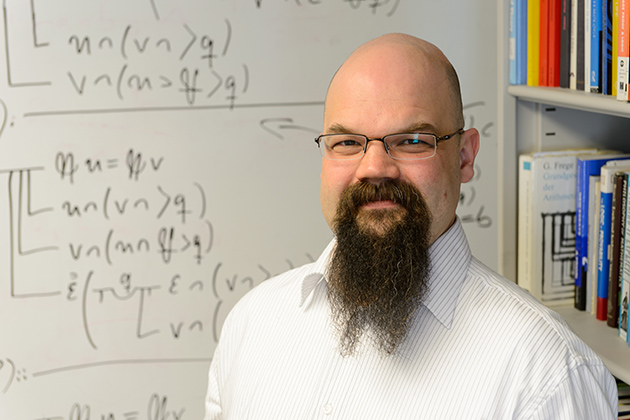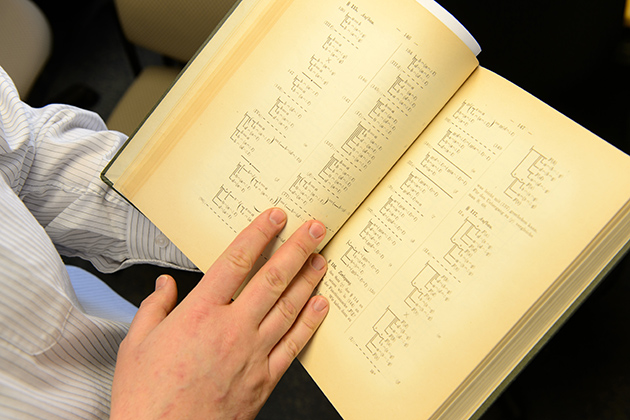
Forty years ago, the publication of Frege: Philosophy of Language by Michael Dummett signaled a landmark shift in the intellectual view of Gottlob Frege, whose work was largely ignored when he first published his ideas and theories in the late 19th and early 20th centuries. Today, Frege is known as a founder of modern logic and a major contributor to our understanding of the foundations of mathematics.
This July, the first complete English translation of Frege’s major work, Grundgesetze der Arithmetik or Basic Laws of Arithmetic, will be published by Oxford University Press. Having the entire body of Frege’s work available in English is expected to again transform the scholarly landscape in the study of writings by the German philosopher, mathematician, and logician.
Marcus Rossberg, assistant professor of philosophy in the College of Liberal Arts and Sciences, is co-editor of the new translation.

“Frege scholarship won’t be the same after this comes out,” Rossberg says. “English-speaking scholars who did not have access to the German text before can now start working with this material, and we will learn much more about Frege as a philosopher.”
Rossberg says Frege’s work was initially dismissed for nearly half a century because it turned out that one section of his work in the philosophy of mathematics was contradictory, specifically Basic Law V of his system. In the 1980s, the studies of Crispin Wright and George Boolos remedied the flawed law with what became known as Hume’s Principle – that one-to-one corresponding concepts have the same cardinal number – which then provided a consistent theory to develop classical number theory. It gave rise to increasing interest in Frege’s philosophy of mathematics.
The subsequent interest in Frege’s work over the years led to several partial translations of Basic Laws of Arithmetic, Rossberg says, though these did not amount to even half of the two-volume, 600-page text, and both lacked consistency in translation and omitted critical information.
“It takes a very peculiar set of skills to be able translate a book like that, because it’s a mixture of a mathematics book and a philosophy book,” Rossberg says. “In order to do justice to a translation, to really capture what Frege was doing, you not only need to be a philosopher and understand philosophy, especially Frege’s philosophy: More is required.”
Further, he adds, translating the work requires the ability to read German and write in English, as well as to understand mathematics and be able to translate what Frege did with mathematical rigor to prove his theorems.

And there was another challenge – the scholar had what Rossberg described as “his own very idiosyncratic notation.”
“Maybe a handful of people can read [the notations],” he says. “What springs out is that it is two-dimensional. A formula not only goes from left to right, but it also goes from bottom to top. Once you are used to it, it is very elegant.”
Rossberg and his co-editor, Philip Ebert at the University of Stirling in Scotland, began working on the translation in 2003, while studying Frege’s works as part of the doctoral program at the University of St. Andrews in Scotland. Under the guidance of their mentor, Crispin Wright (now at NYU and Aberdeen, Scotland), they organized the project under the auspices of Arché, the philosophical research center at St. Andrews, with cooperating Frege scholars from the United States, Canada, Germany, Italy, and the U.K. Initially, the scholars met in Scotland and New York, later convening conferences via Skype.
Rossberg says the complete translation of Frege’s work into English will provide new areas for examination in the scholar’s philosophy and the details of his mathematical proofs.
 “It was thought in the 1950s and 1960s that all of the most interesting parts had been translated so there was no point in looking at the other parts, but upon inspection it turns out not to be true,” he says. “There’s very important philosophy in the remaining parts [of the book] for people interested in reviving his project of [establishing the framework for] the foundation of mathematics. We have the possibility of more closely inspecting his proofs and seeing how he actually carried them out, Frege’s explanation of these proofs, and why he takes certain things to be important, which has never been accessible to English-speaking philosophers before. There are hundreds of pages of philosophical arguments to discuss.”
“It was thought in the 1950s and 1960s that all of the most interesting parts had been translated so there was no point in looking at the other parts, but upon inspection it turns out not to be true,” he says. “There’s very important philosophy in the remaining parts [of the book] for people interested in reviving his project of [establishing the framework for] the foundation of mathematics. We have the possibility of more closely inspecting his proofs and seeing how he actually carried them out, Frege’s explanation of these proofs, and why he takes certain things to be important, which has never been accessible to English-speaking philosophers before. There are hundreds of pages of philosophical arguments to discuss.”
Rossberg says that with his work on the translation complete, he will develop a new graduate seminar on Frege for his UConn students, and also have time to continue his own research into the questions that Frege himself studied, questions he also has an interest in exploring:
“What is the nature of logic? Where does logical and mathematical knowledge come from? What is the nature of mathematical truth? Are there any mathematical objects at all, or are they just convenient fictions?” he says, smiling. “Yes, the small questions.”


